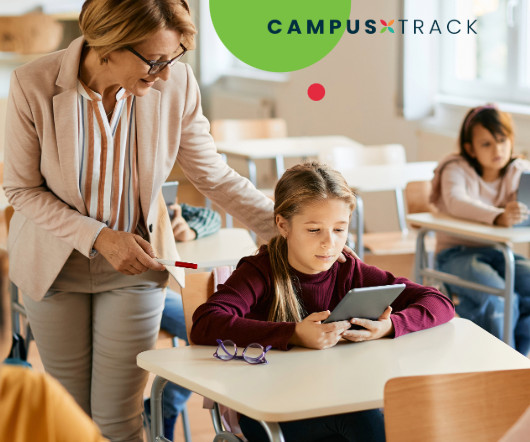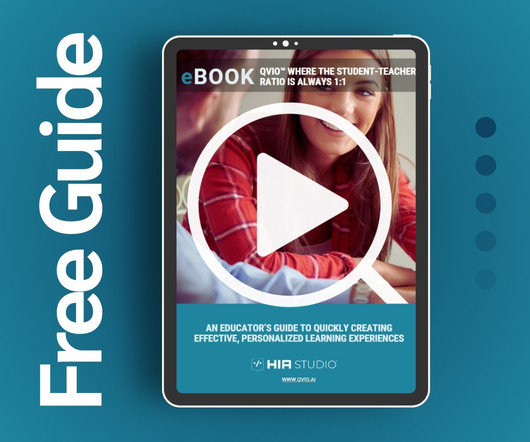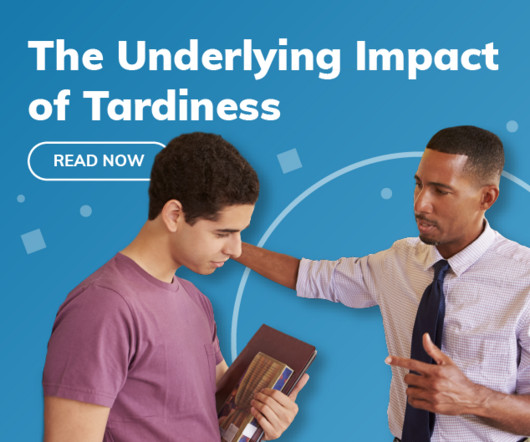How Tech Can Help Students with Disabilities Thrive in STEM Education
EdTech Magazine
OCTOBER 5, 2017
By Calvin Hennick Tools give students with special needs the same access to science and math activities as other schoolchildren.

EdTech Magazine
OCTOBER 5, 2017
By Calvin Hennick Tools give students with special needs the same access to science and math activities as other schoolchildren.

Catlin Tucker
OCTOBER 4, 2017
This year, my students are learning about the design thinking process: empathize, define, ideate, prototype, and test. My teaching team decided to begin the year with a low stakes high-interest challenge: design a water park for our community. The first step in the design thinking process is empathy. Too often my students want to jump right to a solution without really understanding the problem.
This site is protected by reCAPTCHA and the Google Privacy Policy and Terms of Service apply.

Teacher Reboot Camp
OCTOBER 2, 2017
Integrating technology isn’t an easy process. My technology knowledge continues to grow even with over a decade of experience, research, and professional development dedicated to education technology. Being a full-time educator and a mom to a newborn means I highly value my time. Therefore, I’m always searching for quicker and more effective ways to enhance the learning in my classroom.

Digital Promise
OCTOBER 5, 2017
The League of Innovative Schools, Digital Promise’s flagship network of forward-thinking leaders of our nation’s school districts, is honored to welcome 13 districts into the 2017-2018 cohort, bringing the League’s membership to 93 districts in 33 states. The League seeks districts who are developing and sharing promising innovations that advance excellent, equitable learning opportunities for students.

Generative AI holds tremendous promise for all stakeholders in higher education. But guardrails are needed. Strong governance that empower instructors are at the core of a responsible approach to using generative AI in academia.

EdTech Magazine
OCTOBER 6, 2017
By Tommy Peterson Google, Microsoft, Adobe and others offer programs to help get teachers up to speed, and districts often pay for them.

The CoolCatTeacher
OCTOBER 5, 2017
From the Cool Cat Teacher Blog by Vicki Davis Follow @coolcatteacher on Twitter. I’ve taught lots of tools for research with Diigo being one of my favorites. ( Diigo tutorial here.) However, with some recent integration of Google Keep with Google Docs, for this project I have students using Google keep and tagging. I’ve embedded two tutorials below.
EdTech Update brings together the best content for education technology professionals from the widest variety of industry thought leaders.

Digital Promise
OCTOBER 2, 2017
This article originally appeared on Usable Knowledge from the Harvard Graduate School of Education. Read the original version here. For years, we’ve thought that the answer to boosting adolescent reading comprehension lay in building students’ vocabulary. Teens often struggle with the jargon and advanced terminology they encounter as they move into middle and high school, so educators have designed curricula and interventions that explicitly teach these complex words.

EdTech Magazine
OCTOBER 2, 2017
By Amy Brown Educators are already using artificial intelligence in small ways with grading and reading programs.

EdNews Daily
OCTOBER 6, 2017
Written by Dr. Jared Scherz, TeacherCoach. When I was eleven, I went on a rock climbing expedition in Boulder Colorado. I paced nervously before the first climb, as the instructors readied the equipment. From a sharp reprimand, I was jolted out of my nervous daydream. “Don’t step on the rope.” the instructor shouted. Befuddled by this command, I wondered how a rope that was nearly as thick as my leg, could be effected by a barely 80-pound kid.

Teacher Reboot Camp
OCTOBER 6, 2017
Brainstorming is an important process students need to learn to do when innovating, creating, and problem-solving with technology. Brainstorming helps students come up with ideas, organizes ideas, and provides a roadmap for projects. We need to expose students to various types of brainstorming techniques, such as concept mapping, storyboarding, sketchnoting, sketch outlines, audio recording thoughts, etc., so they discover which techniques work best for them.

Advertisement
Schools face increasing challenges as technology becomes integral to education. Efficient device management is essential for maximizing technology use and safeguarding investments. Our article discusses the importance of tracking devices, outlines current challenges, and suggests modern solutions that go beyond traditional methods like Excel. Learn how advanced tracking systems can streamline operations, improve maintenance, and offer real-time updates for better resource allocation.

A Principal's Reflections
OCTOBER 1, 2017
We live in exciting times although it is often difficult to keep up with how fast society is changing. Many of us can remember a world where there was no Internet or smartphones. Now we not only have smart watches, but rumors are swirling that a global Wi-Fi network powered by commercial airliners is in the works that will provide people access virtually anywhere in the world.

EdTech Magazine
OCTOBER 2, 2017
By EdTech Staff Once schools receive E-rate funding, innovating learning can develop.

Ed Tech from the Ground Up
OCTOBER 4, 2017
When a big partnership opportunity comes along, be ready to evaluate it and dive in. The post A Startup Partnership With Google to Support Active Student Listening appeared first on Market Brief.

Teacher Reboot Camp
OCTOBER 4, 2017
Each mission in my new book, Hacking Digital Learning Strategies: 10 Ways to Launch EdTech Missions in Your Classroom , shares an example of the Mission in Action by a teacher I admire. When I was writing the Mission: Debate the Issues, Don’t Diss People , I asked my younger sister, Kimberly Sanchez, to share her school’s project, The Great Debate.

Advertisement
How can we actively engage learners 24/7, on their level and according to their interests, while respecting their learning styles? It’s not impossible. In this guide: Explore how to transform traditional, one-way videos into two-way interactive learning experiences Understand different types of artificial intelligence (AI), including - Generative vs.

Neo LMS
OCTOBER 3, 2017
If the five senses of the human body were to compete for the Most Important Sense Award, I’m sure the eyes would get the trophy. All the other senses would be on a close second place, but vision would triumph. Perhaps it’s the direct connection with the brain, perhaps it’s the high sensitivity of the eyes… No matter the reason, we all perceive sight as a little more important than hearing, smell, taste or touch.

EdTech Magazine
OCTOBER 4, 2017
By Karen Scarfone Learn about services to automate and expedite user management that also address IT operational and security challenges.

Digital Promise
OCTOBER 2, 2017
Over the past five years, I’ve led the Center for Innovative Research in Cyberlearning (CIRCL), funded by the National Science Foundation (NSF). NSF uses the term “cyberlearning” for its portfolio of research projects that investigate emerging technology and emerging learning sciences. The projects seek bold new designs for learning, contrasting with today’s typical laptop- or tablet-based apps.

Teacher Reboot Camp
OCTOBER 1, 2017
In today’s #EdtechMissions chat we shared ideas for learning with video projects. We talked about the importance of storyboarding to plan their projects and learning how to edit. Students also need to learn how to properly remix and attribute Creative Commons content into their projects. In my book, Hacking Digital Learning Strategies: 10 Ways to Launch EdTech Missions , students learn these skills by completing missions to produce a newscast and create a video tutorial.

Speaker: Andrew Cohen, Founder & CEO of Brainscape
The instructor’s PPT slides are brilliant. You’ve splurged on the expensive interactive courseware. Student engagement is stellar. So… why are half of your students still forgetting everything they learned in just a matter of weeks? It's likely a matter of cognitive science! With so much material to "teach" these days, we often forget to incorporate key proven principles into our curricula — namely active recall, metacognition, spaced repetition, and interleaving practice.

Ditch That Textbook
OCTOBER 2, 2017
Christian talked about how the flood waters were up to his waist in his house. His classmate described how his dogs cowered under the bed during the hurricane. An articulate fifth grader with tight braids laid out her family’s plan to stock up on food in case of the worst. We got to visit with these […].

EdTech Magazine
OCTOBER 5, 2017
By Mike Chapple This solution allows IT and cybersecurity teams to redirect efforts toward high-value targets.

The CoolCatTeacher
OCTOBER 5, 2017
A tutorial video From the Cool Cat Teacher Blog by Vicki Davis Follow @coolcatteacher on Twitter. Helping students select the right font sizes could be a challenge. My sister is a graphic design professor and taught me a simple way to select font sizes. Graphic design students might find it a bit oversimplified but for high school students it works like a charm.

EdTech4Beginners
OCTOBER 4, 2017
My school is encouraging inquisitive learners and has taken on a project inspired by the Massachusetts Institute of Technology: MIT. It has huge links with our new STEAM curriculum and will guide the students through this new approach. The project is called the ‘Curiosity Challenge’ Have a look at what it entails in the video below: How did it go?

This white paper examines and proposes revisions to the "Seven Principles for Good Practice in Undergraduate Education" introduced by Arthur Chickering and Zelda Gamson in 1987 for today's technology-driven world.

Neo LMS
OCTOBER 5, 2017
Constructivist learning is an educational theory based on the psychological theories of Constructivist thinkers such as Jean Piaget. His theory — usually referred to as Developmental Stage Theory — described learning and cognitive development as “a progressive reorganization of mental processes resulting from biological maturation and environmental experience”.

EdTech Magazine
OCTOBER 3, 2017
By Meghan Bogardus Cortez By revamping the data evaluation of teacher training programs, state education agencies can ensure their students are getting the best education.

The CoolCatTeacher
OCTOBER 3, 2017
Jeff Gearhart on episode 162 of the 10-Minute Teacher Podcast From the Cool Cat Teacher Blog by Vicki Davis Follow @coolcatteacher on Twitter. Are you studying Mars? Why not let students go live there? Jeff Gearhart is working with teachers in traditional subjects to let students immerse in the subject in Minecraft. In today’s show, learn about Minecraft EDU and how it is being used to teach.

Edsurge
OCTOBER 5, 2017
If 2012 was “ The Year of the MOOC ”—massive open online courses, usually offered for free—2017 could be “The Year of the Microcredential.” A growing number of elite colleges are offering short-form graduate and certificate programs that can be taken online for a fraction of the price of a traditional master’s. Proponents say the new offerings will expand access to graduate education and help workers update their skills in fast-changing fields.

Advertisement
Managing a K-12 campus with constant pressure to meet performance metrics is challenging. And tardiness can significantly limit a school from reaching these goals. Learn more about why chronic lateness matters, and key strategies to address the following impacts: Data errors caused by manual processes Low attendance and graduation rates that affect a school’s reputation Classroom disruption, which leads to poor academic performance High staff attrition and “The Teacher Exodus” Unmet LCAP goals t

Ditch That Textbook
OCTOBER 5, 2017
In a recent workshop I was leading with teachers, the inevitable question came up. We were looking at Google Maps Street View, discussing how it can give students a first-person view of places all over the world — and let them “walk around” independently. Then came that inevitable question: “How do you make sure that […].

EdTech Magazine
OCTOBER 3, 2017
By Meghan Bogardus Cortez In honor of National Cyber Security Awareness Month, here are some basics for keeping students and staff secure.

The CoolCatTeacher
OCTOBER 4, 2017
Mandi Figlioli on episode 163 of the 10-Minute Teacher Podcast From the Cool Cat Teacher Blog by Vicki Davis Follow @coolcatteacher on Twitter. Curriculum Specialist Mandy Figlioli is excited about her school’s adoption of the Inventionland design and prototyping course. Mandy talks about how the course is structured, gives a story of how students are being transformed, and shares how they are re-working the course based on what they learned the first year.

Ask a Tech Teacher
OCTOBER 5, 2017
There seems to be a limitless supply of online education content. In fact, my email box and social media explodes with them. But often, these offerings are too basic, a lite version of a paid program that isn’t terribly robust, confusing, or created by people who don’t really understand how to blend technology and education. As a busy teacher, I want resources that are clear, easy-to-use, accessible by all types of students, scalable, and fun.

Speaker: Chris Paxton McMillin, President of D3 Training Solutions
There are plenty of great authoring tools for developing eLearning, but the one you select could directly impact your course's outcomes. Depending upon your learners’ needs and your organization’s performance goals, you could be overlooking considerations that impact the both effectiveness of your courses and how long it takes to finish them. From general capabilities to specific workflow structures, some aspects are critical when it comes to learning objectives and deadlines.
Let's personalize your content